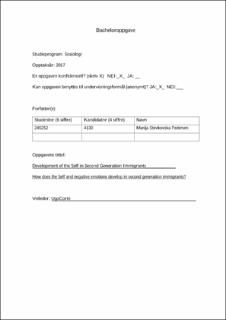| dc.description.abstract | Discrimination because of different ethnicity or race is not the thing of the past even for the most egalitarian countries in the world, such as Norway. In addition, the world is highly globalized, with ethnicities and races mixed up as never before. Second generation immigrants are rising as a group in the world population. Emotions in microsociology have always been important. W. E. B. Du Bois and his phenomenological Theory of Double Consciousness shed a light on a phenomenon of race and discrimination in the early days of sociology in USA. He described the different negative feelings and the struggle individuals endure into forming Self when being treated differently (as less worthy) in the country that feels as much as home to them as to the majority of the country. These feelings develop differently and with different intensity in second generation immigrants. Identity Control Theory and the whole process of verification of identities is guided by emotions. When second generation immigrants' identities are not verified, they will try to intensify their behavior in order to get the desired response. When this fails too, distress and low self-esteem emerge. | |
